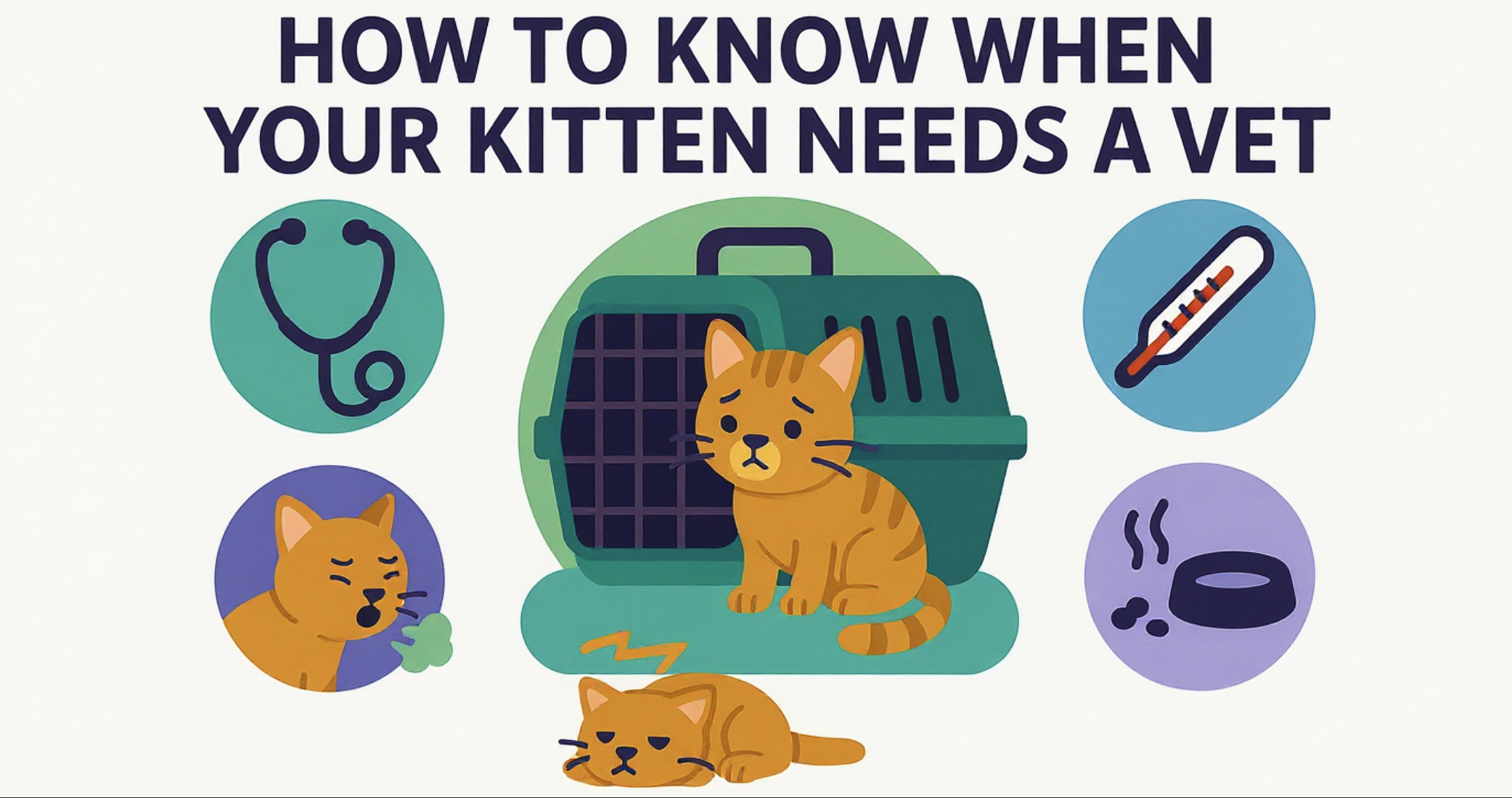
Ever noticed your kitten acting a bit off? As a cat owner for many years, I know how crucial it is to spot the signs early. Kittens can fall ill quickly, and learning how to know if a kitten is sick can make all the difference. Imagine your playful furball suddenly becoming lethargic or refusing food. These are red flags! Regular vet visits are mandatory. Did you know that 52% of cats in the U.S. haven’t seen a vet in the past year? That’s alarming! Early detection and timely care can save your kitten’s life.
Let’s keep those purrs coming!
How to Know if Kitten is Sick
Have you seen your kitten zoom around and then slow down? It’s like a superhero losing power. As someone who loves kittens, I know it’s sad when they aren’t well.
Let’s examine signs that indicate your kitten may need assistance.
Behavioral Changes
Lethargy and Decreased Activity
Kittens are curious and full of energy. If your kitten sleeps more than plays, it could mean trouble. Being tired can mean health problems like low blood sugar or being too cold, which often happen in young cats. Watch their energy closely. If they seem very tired, call a vet.
Changes in Eating or Drinking Habits
Healthy kittens eat a lot. If they eat or drink less, it might be a problem with their stomachs. Stomach issues can worsen if left untreated. Check how much they eat and drink carefully.
If they stop eating or drinking, see the vet right away.
Physical Symptoms
Vomiting or Diarrhea
Throwing up or having diarrhea are warning signs. These can cause your kitten to lose water quickly, leading to more severe health issues.
If this happens frequently, visit the vet promptly for assistance.
Sneezing, Coughing, or Nasal Discharge
Sneezing or coughing may mean a breathing infection. These symptoms often accompany other signs, such as feeling tired or not wanting to eat. If you see these symptoms, take them to the vet soon to stop it from getting worse.
Appearance and Grooming
Dull Coat or Excessive Shedding
A shiny coat is healthy for kittens. A dull coat may indicate that they are lacking nutrients or have underlying health issues. Groom them often to notice changes early on.
If their fur looks different, consider consulting a veterinarian about suitable cat food.
Unusual Lumps or Bumps
When grooming your kitten, look for unusual lumps or bumps that may indicate infections or other health issues.
If you notice anything unusual, contact your veterinarian promptly, as early detection helps maintain their health.
Scientific Research Findings:
-
Emergency Care for Kittens and Young Cats emphasizes the importance of monitoring for signs such as low body temperature.
-
Common Health Conditions in Kittens state that late-stage illnesses cause loss of appetite and difficulty breathing.
Your kitten counts on you to spot small changes. By watching closely, you ensure they get care needed to stay happy and healthy.
Common Signs of a Sick Kitten
Have you seen your kitten playing and then acting strange? It’s like seeing a superhero lose their powers. Knowing when a cat is sick can be hard, but it’s important for their health.
Let’s examine common signs that indicate your kitten may require additional care.
Cat is Sick: Behavior and Physical Signs
When kittens are feeling unwell, they often exhibit different behavior. You might see:
-
Lethargy: Your once-active kitten now sleeps more than plays. This sudden energy drop can mean sickness.
-
Weakness: Trouble jumping or walking can be a warning sign.
-
Decreased Appetite: If your kitten refuses to eat, it could be a serious issue. Vets suggest offering a small canned meal to check if they eat. If not, something may be wrong.
Physical signs are important too. Watch for:
-
Vomiting or Diarrhea: These symptoms can cause dehydration fast.
-
Weight Loss: Losing weight quickly can be concerning and may require a veterinary visit.
Notice Changes in Energy and Friendliness
Kittens are naturally curious and social. A sick kitten might:
-
Sleep More: While kittens sleep lots, too much sleep can mean illness.
-
Avoid Companions: If your kitten stays away from you or other pets, it might feel unwell.
-
Play Less: Not wanting toys or games can indicate a deeper issue.
Watching these changes helps find problems early. Remember, kittens are susceptible to illness from parasites or infections.
Litter Box Habits and Differences
The litter box tells you about your kitten’s health. Look for:
-
Changes in Urination: Excessive or insufficient urination can indicate underlying health issues.
-
Diarrhea or Constipation: Both show that your kitten might be unwell.
-
Bad Breath: Bad smells from the litter box or mouth can mean digestive issues.
Checking the litter box often helps spot these signs early. Encouraging a sick kitten to use the litter box gives clues about their condition.
Causes of Illness in Kittens
Have you noticed your kitten feeling sick suddenly? It’s like seeing a small hero lose its strength. Knowing why kittens get sick helps you act fast to keep them well.
Let’s look at some common reasons that might make your kitten unwell.
Infectious Diseases
Infectious diseases are sneaky problems for kittens. They spread quickly and can be serious. Some common ones are feline distemper, colds, and herpes virus. These make kittens feel bad with sneezing, coughing, and runny noses.
To protect your kitten, administer vaccinations on schedule. Shots work like a shield against germs. Regular vet visits help detect infections early, allowing your kitten to recover quickly.
Parasites
Parasites are tiny bugs that cause big trouble for kittens. Fleas, ticks, and worms are common pests. They cause itching and can lead to more severe health issues if left unattended.
Use flea treatments often to keep parasites away. These treatments help alleviate the discomfort caused by fleas. Additionally, regular deworming helps maintain your kitten’s stomach health.
Environmental Factors
Sometimes the surroundings can harm your kitten. Changes in weather or exposure to hazardous substances can affect their health. Cold weather may cause hypothermia; toxic plants or chemicals might poison them.
Make their space safe by keeping it warm and hazard-free.
Keep harmful items out of reach and provide a cozy bed for comfort.
A loving environment with playtime keeps them happy and healthy.
Here’s a simple table to show common illness causes in kittens:
|
Cause |
Symptoms |
Prevention Tips |
|---|---|---|
|
Infectious Diseases |
Sneezing, coughing, runny nose |
Vaccinations, regular vet check-ups |
|
Parasites |
Itching, discomfort, anemia |
Flea prevention, regular deworming |
|
Environmental Factors |
Hypothermia, poisoning, stress |
Safe environment, warmth, love |
By knowing these causes, you can help keep your kitten healthy and happy. Remember they need you as their hero to fight off sickness.
When to Call a Vet
Have you ever worried when your kitten appears to be sick? I know that feeling well. Kittens are small and can hide their problems. Knowing when to call a vet is important. Let’s look at signs that mean “Vet, now!”
Urgent Signs
Consider your kitten’s sudden lack of play or appetite. These are urgent signs. If you see these, don’t wait:
-
Difficulty Breathing: If your kitten is having trouble breathing, seek help immediately.
-
Severe Vomiting or Diarrhea: Lots of vomiting or diarrhea can cause quick dehydration.
-
Unresponsive or Lethargic: If your kitten doesn’t react to you, act quickly.
-
Bleeding or Injury: Any bleeding or injury needs fast care.
These show serious problems. Quick action helps your kitten’s health.
Persistent Signs
Sometimes symptoms stay like an unwanted guest. If they last, seek advice:
-
Ongoing Sneezing or Coughing: Long sneezing might mean infection.
-
Consistent Lack of Appetite: Not eating for over a day can indicate illness.
-
Continuous Weight Loss: Losing weight over time is worrying.
-
Constant Scratching or Itching: This might be parasites or allergies.
These may not seem urgent but can get worse. Regular vet visits help keep your kitten healthy.
Simple Steps to Follow
Feeling unsure? Here’s a guide on when to call a vet:
-
Watch Closely: Observe your kitten’s behavior and appearance for any changes.
-
List Symptoms: Write down all symptoms, even small ones.
-
Check Temperature: Use a pet thermometer; normal is 100.5°F to 102.5°F.
-
Call the Vet: Tell them the symptoms clearly for advice.
-
Follow Directions: Do what the vet says; they may suggest visiting or home care tips.
Here’s a quick table on when to call a vet:
|
Symptom |
Urgency Level |
Action Needed |
|---|---|---|
|
Difficulty Breathing |
Urgent |
Immediate Vet Visit |
|
Severe Vomiting/Diarrhea |
Urgent |
Immediate Vet Visit |
|
Persistent Sneezing |
Persistent |
Vet Consultation |
|
Lack of Appetite |
Persistent |
Vet Consultation |
Your kitten counts on you to spot these signs early. Acting fast ensures they get needed care and stay safe!
Preventative Care Tips for Your Kitten
Want your kitten to stay happy and healthy? I’ve watched my kitten explore every corner of my home. It’s fun, but I must keep them safe. Here are some tips to help your kitten grow strong.
Regular Veterinary Check-ups
Vet visits protect your kitten like a hero’s shield. They find problems early. I felt calm when the vet said my first kitten was okay. These visits are important for shots, teeth checks, and health exams. BetterVet says regular check-ups can improve your kitten’s life.
Here’s what happens at a vet visit:
|
Check-up Part |
Why It’s Important |
How Often |
|---|---|---|
|
Vaccinations |
Stop diseases |
As vet suggests |
|
Dental Check |
Keep teeth healthy |
Once a year |
|
Weight Monitoring |
Watch growth |
Every visit |
|
Parasite Control |
Stop fleas and worms |
When needed |
Nutrition and Diet
Feeding right is like giving fuel to a race car. It keeps kittens active and well. Kittens require food rich in protein, fat, and essential nutrients. Good food helps them grow fast. Don’t give them human food; it can upset their stomachs. Always have fresh water ready.
Safe Environment
A safe home is important for kittens’ safety. My kitten got stuck in curtains once, so I learned to make my house safer. Remove small things they might eat, secure cords, and make windows safe. A cozy bed and toys will keep them happy.
Kitten Home Care Tips:
-
Keep dangerous items out of reach.
-
Provide a warm sleeping spot.
-
Make sure litter boxes are clean.
Follow these tips to help your kitten become a strong cat. They count on you for safety! Enjoy playing with your furry friend!
Have you seen your kitten play and thought something might be wrong? Knowing when a kitten is sick can save them. Kittens, like little heroes, often hide their sickness. But if you watch closely, you can see signs early. If your kitten acts strange, ask a vet for help.
Preventing problems is the best way to keep them healthy. Regular veterinary visits and vaccinations are crucial. Let’s make sure our kittens stay happy and grow into strong cats!

In her previous life, Lisa traveled extensively, both for work and leisure. After the pandemic struck, Lisa locked up her luggage and adopted a cat ever since.
Lisa is now an avid cat lover, she devotes most of her free time serving as butler to her adorable feline at home. When she is not with her cat, she can be seen using her phone sourcing for the latest cat supplies online.


